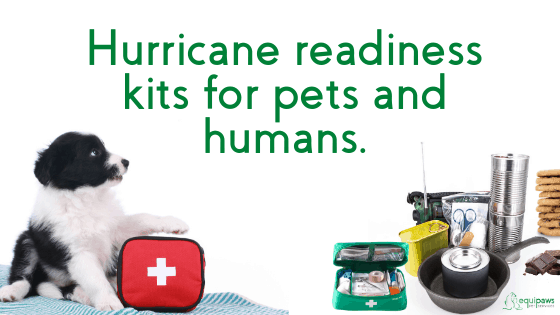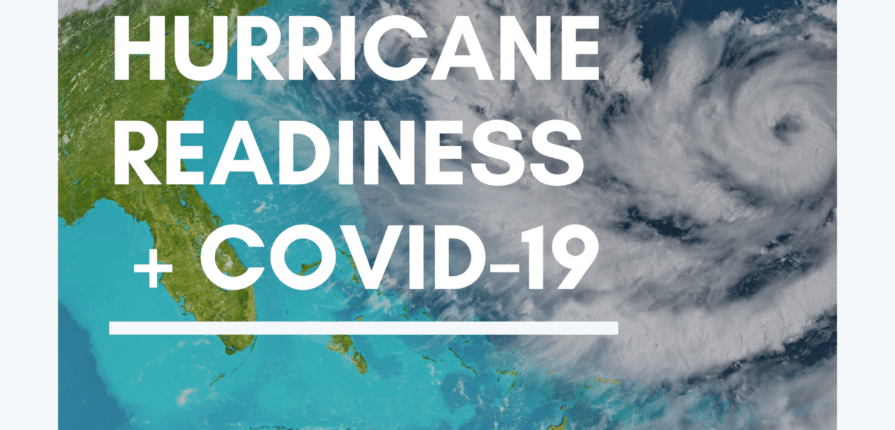Hurricane Readiness for Pet Owners During COVID-19
Hurricane season has one more complication in 2020- the COVID-19 pandemic. We must prepare as we always do for hurricanes with the added variable of a highly-contagious virus. These are our updated readiness guidelines for pet owners in the time of coronavirus.
Start preparing TODAY. Don’t wait until you hear there is a tropical storm forming to do your typical preparations- do them right away. Because of COVID-19, materials are harder to get.
-
- Purchase enough PPE for your whole family. Remember that hurricane clean-up lasts a long time, so purchase accordingly.
- Purchase your medicine in advance
- Get your supplies in advance because stores are operating at different hours.
We urge you to take your pets with you. Hurricanes are traumatic and dangerous for humans and animals alike. Do your best to not leave them behind; keeping dogs tethered to trees is illegal. For those of you living in Miami: there are several pet-friendly shelters that open when evacuations are called for, such as the E. Darwin Fuchs pet-friendly shelter, for example. If you decide to leave town when a hurricane strikes and need a pet-friendly hotel, please:
- Click on this link to BringFido.com to help you find one.
- You can also call Bring Fido at 877-411-3436 for help,
- Or you can also go to OfficialPetHotels.com to find hotels.
- OfficialPetHotels.com
- PetsWelcome.com
- PetFriendlyTravel.com
- Pet Friendly Hotels
You can also contact your veterinarian and inquire about boarding during emergencies. Some veterinarians who offer boarding and are out of flood zones may offer boarding. These spaces are limited, so call to reserve your space NOW.
There may also be local pet boarding facilities that are out of the flood zone and equipped with generators. SoMi Pet Resort is one. A Country Cat House is another.
Service Animals and Hurricanes:
According to FDA.gov, “pets that help people with disabilities are allowed in General Population Shelters and Red Cross Shelters as long as they meet the requirements for service animals under federal law (see ADA Requirements for Service Animals).”
Where to take your pets if ordered to evacuate during a hurricane:
There are eight Pet Friendly Evacuation Centers (PFEC) in South Florida. According to Tracy Jackson, Broward County’s emergency manager, evacuation shelters will be instituting social distancing due to COVID-19. That means there will be less space for people, and therefore, less space for pets. It is ESSENTIAL that you start making plans in case you live in an evacuation or flood zone right now.
Pet-Friendly evacuation centers open depending on the severity of the hurricane for pet owners residing in qualified evacuation zones, unsafe structures or mobile homes. Pet owners are urged to bring food and provisions for themselves and for their pets, as well as PPE, hand sanitizer, and whatever your family needs to be safe.
Other updates due to COVID-19 include the way we handle cats. Different rules will be put into place, especially when it comes to cats. You must wear gloves when handling them, so now is the time to get them used to you wearing gloves.
The PFEC locations will be announced as they are opened prior to the storm’s arrival. Visit miamidade.gov, call 311 or monitor your local news to keep up with the latest information. All animals will be assessed to determine if the animal presents a safety risk. Vaccinations nor medical treatment are NOT provided at emergency evacuation centers. Animals accepted at pet-friendly evacuation centers include: dogs, cats, ferrets, gerbils, guinea pigs, hamsters, mice, common household birds and certain breeds of rabbits under 10 pounds.
Evacuation considerations during COVID-19
From Miami-Dade County’s emergency evacuation site:
“COVID-19 is a new coronavirus that has spread throughout the world. It is thought to spread mainly from person to person, mainly through respiratory droplets produced when an infected person coughs or sneezes. Spread is more likely when people are in close contact with one another (within about 6 feet). It may be possible that you can get COVID-19 by touching a surface or object that has the virus on it and then touching your mouth, nose, or possibly your eyes.
If you need to evacuate, it is important to observe the COVID-19 Preventive Measures in the Evacuation Center:
- Bring your mask (face covering) and keep it on at all times. Anyone over 2 years old should use a cloth face covering while at the evacuation center.
- Remember to wash your hands regularly with soap and water for at least 20 seconds.
- Bring your hand sanitizer and disinfectant wipes to disinfect frequently touched items within your assigned space at the evacuation center.
- Avoid touching your eyes, nose, and mouth.”
- Keep a 6-feet distance between yourself and persons that are not part of your immediate family, remember the cloth face mask is not a substitute for social-distancing.
- Place used tissues in the trash.”
For more information and updates, visit Miamidade.gov. You can also watch the video below on the impact of COVID-19 on hurricane preparedness.
Requirements for admittance to Pet-Friendly Evacuation Centers:
Keep in mind that not every pet evacuation center (PEC) will be open for every evacuation, so call your local hurricane hotline to find out which centers will be open. Pet owners will have to register for pet-friendly evacuation! Pet owners will also need to do the following:
- Provide proof of residency within an evacuation zone
- Present medical and current vaccination records for each pet. Annual rabies vaccinations and a visible Miami-Dade County dog license are required by Miami-Dade County Code. Strict enforcement concerning these violations is essential to ensure a rabies-free community. Cats are also required to have annual rabies vaccinations.
- Pet owners must bring supplies for themselves and their pet(s)
- Limit four pets per household
- Family member must remain in the PEC with the pet(s)

How to prepare for your pets during a hurricane:
-
- Crate or carrier for each pet large enough for the pet to turn around in and cat carriers large enough for a small litter box
- Pet Identification Forms for each pet with photos attached
- Collar and leash for all pets (including cats) with ID and rabies tags on all collars and make sure they are microchipped. Some pet owners will write their phone numbers directly on their pets’ bellies with marker.
- Vaccination records of each pet
- Three-week supply of each pet’s medications
- Sedatives for pets that frighten easily
- Disposable litter boxes and scoop
- Extra cat litter
- Plastic bags, paper towels, and cleaning supplies, including hand sanitizer, gloves, and disinfectant sprays.
- Three-week supply of food for each pet
- Manual can opener
- Food and water bowls for each pet
- Three-week supply of drinking water (you can fill your clean tub with water and use that for them).
- Toys or blankets your pet will find familiar
- Towels
- Grooming items
- Detailed instructions for animal care and rescue workers
- Copy of emergency numbers and family evacuation plan
- Copy of veterinarian’s information
- Flashlight and batteries
- Pet first aid kit: include bandaging material, antiseptic ointment, alcohol, gloves, tweezers, muzzle, and gauze
- List of all hotels accepting pets in the area
- First aid books for pets and humans
How to prepare your hurricane readiness kit for yourself:
- Water – at least 1 gallon daily per person for 3 to 7 days (but we keep more just in case- fill bathtubs and all available containers)
- Food – at least enough for 3 to 7 days (we also keep more of this)
- Non-perishable packaged or canned food / juices
- Foods for infants or the elderly
- Snack foods
- Non-electric can opener
- Cooking tools / fuel
- Paper plates / plastic utensils
- Blankets / Pillows, etc.
- Clothing – seasonal / rain gear/ sturdy shoes
- First Aid Kit / Medicines / Prescription Drugs
- Hand sanitizer, disinfectant wipes or sprays, and enough masks to last for all of your family.
- Special Items – for babies and the elderly
- Toiletries – hygiene items
- Moist wipes
- Flashlight / Batteries
- Radio – Battery operated and NOAA weather radio
- Cash – Banks and ATMs may not be open or available for extended periods.
- Keys
- Toys, Books and Games
- Important documents – in a waterproof container (insurance, medical records, bank account numbers, Social Security card, etc.)
- Document all valuables on video if possible
- Tools – keep a set with you during the storm
- Vehicle fuel tanks filled
Communication: Heavy storms cause issues with phone lines. Have back up plans for where to meet, and consider investing in walkie talkies for your family. For Equipaws Clients before, during, and after the hurricane: please continue to call our business line for any questions, and be sure to leave a message as well as email us. We’re going to do our best to be in touch with you before the storm and as soon as the storm is over and our team is once again safe.
Important links for hurricane readiness in Miami:
- Download and print the 2020 Hurricane Readiness Guide here.
- Learn whether you’re in an evacuation zone here.
- Learn about mandatory evacuation orders in Miami here.
- If you’re not leaving, this is an article on establishing a safe place in your home from the University of Florida: http://disaster.ifas.ufl.edu/pdfs/chap03/d03-06.pdf
- Hurricane information: https://www.ready.gov/hurricanes
- Learn how to make your own emergency supply kit here.
- Keep up to date with http://www.miamidade.gov/emergency/ when it activates.
- Find open evacuation centers click here.
- Report a power outage to FPL here.
- Download the Ready MDC app for iOS and Android: https://itunes.apple.com/us/app/readymdc/id1https://mdc.maps.arcgis.com/apps/webappviewer/index.html?id=4919c85a439f40c68d7b3c81c3f44b58382263668?mt=8 and https://play.google.com/store/apps/details?id=gov.miamidade.ReadyMDC
- Find bus emergency pick up sites in Miami here.
List of all the hurricane shelters that may open during a hurricane evacuation:
Miami-Dade County: Hurricane Guide
Not every site will open for every evacuation. For Miami-Dade shelter addresses and evacuation routes, click here or dial 3-1-1 to find out which shelters will be open when an evacuation is announced.
– Dr. Michael M. Krop Senior High School (Pet-friendly) – North Miami Senior High School – North Miami Beach Senior High School – Highland Oaks Middle School – Miami Central Senior High School – Lawton Chiles Middle School – Hialeah Gardens Senior High School – Barbara Goleman Senior High School – Country Club Middle School – Miami Carol City Senior – Booker T. Washington Senior High School – Ronald Reagan Senior High School – Charles Drew Middle School – Miami Coral Park Senior High School – W.R. Thomas Middle School – Robert Morgan Educational Center – Terra Environmental Senior High School – South Dade Senior High School – South Miami Senior High School – Felix Varela Senior High School
For Broward shelter addresses and evacuation routes, click here or dial the emergency hotline at 3-1-1 or 954-831-4000.
Monroe County: Storm Ready Guide
– Coral Shores High School (Pet-friendly) – Key West High School (Pet-friendly) – Marathon High School (Pet-friendly) – Sugarloaf Elementary School (Pet-friendly)
Monroe County shelters will not open for Category 3,4, or 5 hurricanes. For more information about where to evacuate in the event of a Category 3 or higher, check the Monroe County Emergency Management website before a storm or call 1-800-955-5504.
Hurricane Visits for Equipaws Pet Services Clients
Visits before and after the storm:
Daily Dog Walking Clients: First and foremost, please let us know if you’re going out of town to avoid the storm or if you will be home and do not need visits so we don’t send our employees out to your homes unnecessarily. If you do leave town, once you return, please reach out and let us know so we can resume our regular walking schedule once it is safe to do so. We will also reach out to you as soon as we are able to with any updates after the storm passes.
Pet sitting clients: The safety of our team and your pets is our priority. We will contact clients who can’t return in private messages to continue organizing your pets’ care and safety.
Best of luck to all of you riding out any natural disaster. Your team of Equipaws pet sitters will be here for you.

A founding member of the Equipaws family, Frankie can mostly be found working behind the scenes, helping co-create online branding, managing several social media accounts, designing brand collateral, writing copy, and managing events. She also fills in for pet sitters and dog walkers when needed in Palmetto Bay, Pinecrest, and South Miami. Her own small pack consists of Boots the Shih Tzu mix and Nutmeg the Chiweenie.

